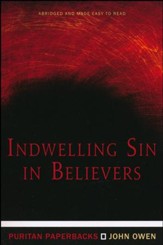Quotes about Sin-Indwelling
The Christian life is a war, and the fiercest battles are those that rage within the heart of every believer. The new birth radically and permanently changes a person’s sinful nature, but it does not immediately liberate that nature from all of the remnants of sin. Birth is followed by growth, and that growth involves warfare.
Jesus teaches us that there is something far more fundamental to our sinfulness than the actual sins we commit. Our sins do not make us sinful. Rather, we commit sins because at the very center of our lives, we are sinful. Sin has invaded the inner recesses of our personalities.
The signs of a flesh-pleaser or sensualist are these:
1. When a man in his desire to please his appetite, does not do it with a view to a higher end, that is to say to the preparing himself for the service of God; but does it only for the delight itself.
2. When he looks more eagerly and industriously after the prosperity of his body than of his soul.
3. When he will not refrain from his pleasures, when God forbids them, or when they hurt his soul, or when the necessities of his soul call him away from them.
4. When the pleasures of his flesh exceed his delights in God, and His holy word and ways, and the expectations of endless pleasure. When he had rather be at a play, or feast, or other entertainment, or getting good bargains or profits in the world, than to live in the life of faith and love, which would be a holy and heavenly way of living.
5. When men set their minds to scheme and study to make provision for the pleasures of the flesh; and this is first and sweetest in their thoughts.
6. When they had rather talk, or hear, or read of fleshly pleasures, than of spiritual and heavenly delights.
7. When they love the company of merry sensualists, better than the communion of saints, in which they may be exercised in the praises of their Maker.
8. When they consider that the best place to live and work is where they have the pleasure of the flesh. They would rather be where they have things easy, and lack nothing for the body, rather than where they have far better help and provision for the soul, though the flesh be pinched for it.
9. When he will be more eager to spend money to please his flesh than to please God.
10. When he will believe or like no doctrine but “easy-believism,” and hate mortification as too strict “legalism.” By these, and similar signs, sensuality may easily be known; indeed, by the main bent of the life.
We must learn where our personal weaknesses lie. Once they are identified, we must be ruthless in dealing with them. Earlier generations called this the “mortification of the flesh,” that is, pronouncing the death sentence upon sin and putting that sentence into daily effect by killing all that sets itself against God’s purpose in our lives.
Made For His Pleasure, Moody Press, 1996, p. 33. Get this book!
I cannot pray, except I sin. I cannot preach, but I sin. I cannot administer, nor receive the holy sacrament, but I sin. My very repentance needs to be repented of and the tears I shed need washing in the blood of Christ.
We still have the presence of sin, nay, the stirrings and workings of corruptions. These make us to have many a sad heart and wet eye. Yet Christ has thus far freed us from sin; it shall not have dominion. There may be the turbulence, but not the prevalence of sin. There may be the stirrings of corruption. It was said of Carthage that Rome was more troubled with it when half destroyed than when whole. So a godly man may be more troubled with sin when it is conquered than when it reigned. Sin will still work, but it is checked in its workings. They are rather workings for life than from life. They are not such uncontrolled workings as formerly. Sin is under command. Indeed, it may get advantage, and may have a tyranny in the soul, but it will never more be sovereign. I say, it may get into the throne of the heart and play the tyrant in this or that particular act of sin, but shall never more be as a king there. Its reign is over; you will never yield a voluntary obedience to sin. Sin is conquered, though it still has a being within you.
It is our own evil desires that lead us into temptation. We may think we merely respond to outward temptations that are presented to us. But the truth is, our evil desires are constantly searching out temptations to satisfy their insatiable lusts (James 1:14).
Copied from The Pursuit of Holiness by Jerry Bridges, © 1996, p. 63-64. Used by permission of NavPress – www.navpress.com. All rights reserved. Get this book!
Indwelling sin remains in us even though it has been dethroned. And though it has been overthrown and weakened, its nature has not changed. Sin is still hostile to God and cannot submit to His law (Romans 8:7). Thus we have an implacable enemy of righteousness right in our own hearts. What diligence and watchfulness is required of us when this enemy in our souls is ready to oppose every effort to do good!
Copied from The Pursuit of Holiness by Jerry Bridges, © 1996, p. 60-61. Used by permission of NavPress – www.navpress.com. All rights reserved. Get this book!
Satan can never undo a man without himself; but a man may easily undo himself without Satan.
A Puritan Golden Treasury, compiled by I.D.E. Thomas, by permission of Banner of Truth, Carlisle, PA. 2000, p. 292.
The best prayer I ever prayed had enough sin to damn the whole world.
The human heart has so many crannies where vanity hides, so many holes where falsehood lurks, is so decked out with deceiving hypocrisy, that it often dupes itself.
No one knows the one-hundredth part of the sin that clings to his soul.
Sin is not merely wrong acts and thoughts, but sinfulness as well, an inherent inner disposition inclining us to wrong acts and thoughts. We are not simply sinners because we sin; we sin because we are sinners.
Christian Theology, Baker, 1998, p. 596. Get this book!
How to overcome the flesh:
1. Be honest about the presence and nature of sin continuing in your life. Paul was. In Colossians 3:5-9 he recognizes that the seeds of sexual immorality, impurity, lust, evil desires, greed, anger, rage, malice, slander, filthy language and lying, may remain in true Christians and plague their lives.
2. See the sin which continues to indwell you not in the light of your perspective but in the light of God’s judgment. Any and all sin merits His wrath.
3. Remember who you are as a Christian. You have been crucified, buried and raised with Christ (Col. 3:1-3). Consequently you are no longer under the reign and rule of sin (Rom. 6:14,18). Now you must set your mind on Christ and on His reign in your life, and express your new identity in Christ by a life of holiness.
4. Refuse sin. Do not compromise with it; rather, put it to death (Col. 3:5).
5. Fill your life with Christ-like characteristics. (“Put on compassion, kindness, humility, gentleness and patience”, Col. 3:12). In this way you will leave less and less room for sinful ones (v. 12-17).
Healthy Christian Growth, by Permission of the Banner of Truth Trust, Carlisle, PA. 1991, p. 20-21.
[Our flesh] indicates that the essential way in which people are rebelling against God is that they are assuming that, like Him, they can make the decisions necessary for enjoying a fulfilled and happy future. The folly of this rebellion is that people think that they love themselves more, are wiser, and thus better able than the all-loving, omniscient, omnipotent God to provide for themselves the fulfillment they crave. Thus conversion, according to Jesus, reverses the act of the Fall and makes a declaration, not of independence from God, but dependence on Him.
The Unity of the Bible, Zondervan Publishing House, 1992. Get this book!
Prayer is the humble first step in the battle against our indwelling sin. It says, “I am taking sin seriously, I cannot do this on my own, and I need the help of God.” When we pray for greater conviction of sin, God will give it to us, and we will be motivated to wage war against it.
Growing Up Christian, P&R, 2005, p. 187. Used by Permission. Get this book!
Although sin no longer rules us, we still are naturally sinful. God considers us righteous and credits us with the spotless record of Christ, but we still do sin. In fact, the battle with our indwelling sin starts at our conversion. Through justification we are declared righteous, and it is at this point that our sanctification – our growing in holiness – begins.
There still remains the powerful, active, influence of sin within us. It is presented as a “law” [Rom. 7:23] because that is how it operates within us – it seeks to command and subdue us; it insists upon adherence; it targets our desires to do anything holy.
Anything that springs from self, however small it may be, is sin. Self-energy or self-complacency in service is sin. Self-pity in trials or difficulties, self-seeking in business or Christian work, self-indulgence in one’s spare time, sensitiveness, touchiness, resentment and self-defense when we are hurt or injured by others, self-consciousness, reserve, worry, fear, all spring from self and all are sin.
The Calvary Road, Christian Literature Crusade, 1950, p. 29. P.O. Box 1449, Fort Washington, PA 19034-8449. Used by Permission.
It is always self who gets irritable and envious and resentful and critical and worried. It is self who is hard and unyielding in its attitudes to others. It is self who is shy and self-conscious and reserved.
The Calvary Road, Christian Literature Crusade, 1950, p. 22. P.O. Box 1449, Fort Washington, PA 19034-8449. Used by Permission.
[The flesh] knows that if the spiritual life gets hold of it, all its self-centeredness and self-will are going to be killed and it is ready to fight tooth and nail to avoid that.
The flesh hates everything about God. Since it resists everything about God, it resists every way we try to taste Him and know Him and love Him. And the more something enables us to find God and feast on Him, the more violently the flesh fights against it. It takes its battle to every quarter of the soul: When the mind wants to know God, the flesh imposes ignorance, darkness, error and trivial thoughts. The will can’t move toward God without feeling the weight of stubbornness holding it back. And the affections, longing to long for God, are constantly fighting the infection of sensuality or the disease of indifference.
The Enemy Within, P&R Publishing, 1998, p. 48. Used by Permission. Get this book!
Your flesh will whisper to you that strictness and anxious care about obedience are legalism – the gospel came to deliver you from such things! And besides, if you really do commit a sin, you can be forgiven later.
The Enemy Within, 1998, P&R Publishing, p. 65. Used by Permission. Get this book!
You can feel the hostility of the flesh whenever you approach God – it makes real love for Him into work: Digging around the Bible to find a juicy new insight to impress your small group is like sailing the Caribbean, but poring over the Scriptures to find the Lover of your soul is like skiing up Mount Everest. Conjuring up a happy mood with some music you don’t even know the words to is like solving 2 + 2 with a calculator. But savoring the glory of Christ and His tender love until your heart is softened toward Him is like using mental math to calculate pi to the thousandth place. And giving a birthday present to your best friend is like forcing down some double-fudge brownies. But giving up your extra bedroom to a homeless person in the name of Jesus is like eating the Rockies for breakfast.
The Enemy Within, P&R Publishing, 1998, p. 47. Used by Permission. Get this book!
But every last drop of poison is poison; every spark of fire is fire; and the last bit of flesh that remains in the believer is still enmity. When God’s grace changes our nature, it doesn’t change the nature of the flesh. It conquers it, weakens it, mortally wounds it, so that we are no longer Captain Ahabs by nature; yet his defiant malice smolders in our flesh. By the time Paul wrote Romans, he must have been as Christlike as anyone can expect to be on this side of heaven, and he surely spend his days putting his flesh to death. Still he cried out for deliverance from this irreconcilable enemy (Rom. 7:24).
The Enemy Within, P&R Publishing, 1998, p. 45. Used by Permission. Get this book!
The flesh works to make you forget the design (that you are saved to be holy) and think only of the remedy (if you sin you’ll be forgiven). It preaches half a gospel (a twisted gospel) to us: “Go ahead and indulge – it’s already paid for.” Those who fall prey to such deception are evidently many, since the Scriptures go to such lengths to condemn it (Romans 3:5-8; 6:1-4; Jude 4).
I am more afraid of my own heart than of the pope and all his cardinals.
To fight against sin is to fight against the devil, the world and oneself. The fight against oneself is the worst fight of all.
Nothing is easier than sinning.
Those who are pleasing to God testify with the penitent tax-collector in the Temple: “God, be merciful to me, the sinner!” (Luke 18:13). Augustine pleaded, “Lord, save me from that wicked man, myself.” John Knox, perhaps the greatest preacher in the history of Scotland, confessed, “In youth, in middle age and now after many battles, I find nothing in me but corruption.” John Wesley wrote, “I am fallen short of the glory of God, my whole heart is altogether corrupt and abominable, and consequently my whole life being an evil tree cannot bring forth good fruit.” His brother Charles, who penned so many great hymns, confessed, “Vile and full of sin I am.” Augustus Toplady, who wrote the beloved hymn “Rock of Ages,” said of himself, “Oh, that such a wretch as I should ever be tempted to think highly of himself. I am myself nothing but sin and weakness, in whose flesh naturally dwells no good thing.”
Though we have been forgiven, and though we have been made new in Christ, we’re like Lazarus. We came out of the grave; we have new life, but we stink. We have our dirty grave clothes on. We are a new creation, incarcerated in unredeemed flesh. And we are seduced by the remnants of our fallenness. Satan’s temptation to us is to hold onto sin and not come to righteousness. Satan’s temptation to us is to hold onto the lust of the flesh, the lust of the eyes, and the pride of life.
Four Features of Triumphant Prayer. The sermon originally appeared at: (https://www.gty.org/library/sermons-library/42-273/four-features-of-triumphant-prayer) at www.gty.org. © 1969-2008. Grace to You. All rights reserved. Used by Permission.
Once regenerated, we are delivered from the penalty of sin and from the authoritative power of sin, but not from the continued presence and influence of sin. Sin is no longer reigning, but it is remaining.
Pastoral Leadership for Manhood and Womanhood, ed. Wayne Grudem and Dennis Rainey, Crossway, 2002, p. 196.
On the whole, the popular Christian literature I have reviewed locates the source of our problems far more readily in one’s parents, one’s past, and one’s pain than in one’s pervasive depravity. Unless you have a firm grounding in biblical teaching, these materials will surely convince you that low self-esteem and unmet needs are the problem, not indwelling sin.
Pastoral Leadership for Manhood and Womanhood, ed. Wayne Grudem and Dennis Rainey, Crossway, 2002, p. 195.
I have had more trouble with myself than with any other man.
We have within us a self that has its poison from Satan – from hell – and yet we cherish and nourish it. What do we not do to please self and nourish self – and we make the devil within us strong… Look at your own life. What are the works of hell? They are chiefly these three: self-will, self-trust, and self-exaltation.
I would not be the sport and prey of wild, vain, foolish, and worse imaginations: but this evil is present with me. My heart is like a highway, like a city without walls or gates: nothing so false, so frivolous, so absurd, so impossible, or so horrid, but it can obtain access, and that any time, in any place. Neither the study, the pulpit, nor even the Lord’s table exempt me from their intrusion.
The flesh is the old life, the natural life inherited from Adam, with its apparent resources of personality, of ancestry, of commitment, of dedication, and so forth. You can do all kinds of religious things in the flesh. The flesh can preach a sermon. The flesh can sing in the choir. The flesh can act as an usher. The flesh can lead people to Christ. Did you know that? The flesh can go out and be very zealous in its witnessing and amass a terribly impressive list of people won to Christ, scalps to hang on a belt. The flesh can do these things but it is absolutely nauseating in the eyes of God. It is merely religious activity. There is nothing wrong with what is being done, but what is terribly wrong is the power being relied upon to do it (Ray Stedman).
Legalism, www.RayStedman.org, Used by permission.
The choicest believers, who are assuredly freed from the condemning power of sin, ought yet to make it their business all their days to [put to death] the indwelling power of sin.
St. Augustine teaches us that there is in each man a Serpent, an Eve, and an Adam. Our senses and natural propensities are the Serpent; the excitable desire is the Eve; and reason is the Adam. Our nature tempts us perpetually; criminal desire is often excited; but sin is not completed till reason consents.
Often our misunderstanding of God’s Word is due not to innocent intellectual slips or lack of information, but rather to a deep refusal to submit to God’s demands. A person who intends to manage his own affairs, maintain his pride, and secure esteem and glory from his fellow human beings will twist the words of Jesus to support his own self-esteem. The evil of the human heart precedes and gives rise to many of our apparently intellectual misunderstandings of Scripture.
Desiring God, p. 279, copyright Bethlehem Baptist Church, used by permission. www.DesiringGod.org. Get this book!
Love is motivated by the joy of sharing our fullness, but the works of the flesh are motivated by the desire to fill our emptiness… [The flesh is] man’s ego which feels a deep emptiness and uses the means within its own power to fill that emptiness. If it is religious, it may use law; if it is irreligious, it may use booze… [Yet] when God frees us from guilt and fear and greed and fills us with His all-satisfying presence, the only motive left is the joy of sharing our fullness.
The root of our problem is not ignorance. Beneath ignorance is hardness of heart against God and His ways… against the good I know.
Why I Love the Apostle Paul, Copyright 2019, John Piper. Used by permission. www.DesiringGod.org. Page 118.
A Christian is not a person who experiences no bad desires. A Christian is a person who is at war with those desires by the power of the Spirit. Conflict in your soul is not all bad. Even though we long for the day when our flesh will be utterly defunct and only pure and loving desires will fill our hearts, yet there is something worse than the war within between flesh and Spirit – namely, no war within because the flesh controls the citadel and all the outposts. Praise God for the war within! Serenity in sin is death. The Spirit has landed to do battle with the flesh. So take heart if your soul feels like a battlefield at times. The sign of whether you are indwelt by the Spirit is not that you have no bad desires, but that you are at war with them!
The War Within: Flesh vs. Spirit, June 19, 1983, Used by permission. www.DesiringGod.org.
So deeply planted are the roots of human corruption, that even after we are born again, renewed, “washed, sanctified, justified,” and made living members of Christ, these roots remain alive in the bottom of our hearts, and, like the leprosy in the walls of the house, we never get rid of them until the earthly house of this tabernacle is dissolved. Sin, no doubt, in the believer’s heart, has no longer dominion. It is checked, controlled, mortified, and crucified by the expulsive power of the new principle of grace. The life of a believer is a life of victory, and not of failure. But the very struggles which go on within his bosom, the fight that he finds it needful to fight daily, the watchful jealousy which he is obliged to exercise over his inner man, the contest between the flesh and the spirit, the inward “groanings” which no one knows but he who has experienced them – all, all testify to the same great truth, all show the enormous power and vitality of sin. Mighty indeed must that foe be who even when crucified is still alive!
What a mass of infirmity and imperfection cleaves to the very best of us at our very best!
There is a battle presently raging right now in your heart. “For the flesh sets its desire against the Spirit, and the Spirit against the flesh; for these are in opposition to one another” (Gal. 5:17). It is a battle Scripture says, between the personal Spirit and a personified flesh within you. It is not a head-on collision, but two opposing forces seeking to pull us in two opposite directions, one to righteousness and one to unrighteousness. This is the bottom line as to why some Christians honor God and others do not. It is the difference between living in the Spirit and living in the flesh.
The saints are sinners still. Our best tears need to be wept over, the strongest faith is mixed with unbelief, our most flaming love is cold compared with what Jesus deserves, and our intensest zeal still lacks the full fervor which the bleeding wounds and pierced heart of the crucified might claim at our hands. Our best things need a sin offering, or they would condemn us.
Beware of no man more than of yourself; we carry our worst enemies within us.
Our prayers have stains in them, our faith is mixed with unbelief, our repentance is not so tender as it should be, our communion is distant and interrupted. We cannot pray without sinning, and there is filth even in our tears.
You will find indwelling sin frequently retarding you the most, when you are most earnest. When you desire to be most alive to God – you will generally find sin most alive to repel you.
We must not trust our heart at any time; even when it speaks most fair, we must call it liar; and when it pretends to the most good, still we must remember its nature, for it is evil, and that continually.
When a man is saved by divine grace, he is not wholly cleansed from the corruption of his heart. When we believe in Jesus Christ all our sins are pardoned; yet the power of sin, albeit that it is weakened and kept under by the dominion of the new-born nature which God doth infuse into our souls, doth not cease, but still tarrieth in us, and will do so to our dying day.
I could fight the devil; I could overcome every sin that ever tempted me, if it were not that I had an enemy within. Those Diabolians within do more service to Satan than all the Diabolians without. As Bunyan says in his Holy War, the enemy tried to get some of his friends within the City of Mansoul, and he found his darlings inside the walls did him far more good than all those without. Ah! Christians, thou couldst laugh at thine enemy, if thou hadst not thine evil heart within; but remember, thine heart keeps the keys, because out of it are the issues of life. And sin is there. The worst thing thou has to fear is the treachery of thine own heart.
Christian, remember how many backers thy evil nature has. As for thy gracious life, it finds few friends beneath the sky; but thine original sin hath allies in every quarter. It looks down to hell, and it finds them there, demons ready to let slip the dogs of hell upon thy soul. It looks out into the world, and sees “the lusts of the flesh, the lusts of the eye, and the pride of life.” It looks around, and it seeth all kinds of men, seeking, if it be possible, to lead the Christian from his steadfastness. It looks into the Church, and it finds all manner of false doctrine ready to inflame lust, and guide the soul from the sincerity of its faith. It looks to the body, and it finds head, and hand, and foot, and all other members ready to be subservient to sin. I could overcome my evil heart if it had not such a mighty host of allies, but it makes my position doubly dangerous, to have foes without the gates, in league and amity with a foe more vile within.
There is one thing which seldom gets weaker through old age – that is, old Adam; he is as strong in his old age as he is in his young age, just as able to lead us astray when our head is covered with grey hairs, as he was in our youth. We have heard it said that growing in grace will make our corruptions less mighty; but I have seen many of God’s aged saints, and asked them the question, and they have said, “No,” their lusts have been essentially as strong, when they have been many years in their Master’s service, as they were at first, although more subdued by the new principle within. So far from becoming weaker, it is my firm belief that sin increases in power.
Temptation almost always begins in the flesh (James 1:14). Our flesh sets fire to sin. Satan simply fans the flames. Satan is powerless until we first say “yes” to sin. He exploits our sinful decisions, most often by intensifying the course of action we have already chosen (Eph. 4:26-27).
Tactics of Temptation, November 8, 2006, www.enjoyinggodministries.com. Used by Permission.
Having nailed our old nature to the cross, we keep wistfully returning to the scene of its execution. We begin to fondle it, to caress it, to long for its release, even to take it down again from the cross. We need to learn to leave it there. When some jealous, or proud, or malicious, or impure thought invades our mind we must kick it out at once. It is fatal to begin to examine it and consider whether we are going to give in to it or not. We have declared war on it; we are not going to resume negotiations. We have settled the issue for good; we are not going to re-open it. We have crucified the flesh; we are never going to draw the nails.
Taken from The Message of Galatians by John R.W. Stott. Copyright(c) 1968 John R. W. Stott. Used by permission of InterVarsity Press, PO Box 1400, Downers Grove, IL 60515, p. 151-152. www.ivpress.com. http://www.ivpress.com/cgi-ivpress/book.pl/code=288.
The Believer’s Warfare: Internal, with the flesh – Gal. 5:17; Not after the flesh – 2 Cor. 10:3; with the armor of light – Rom. 13:12; external, with the world – John 16:33; not by resistance but submission – James 4:7; with the armor of righteousness – 2 Cor. 6:7; infernal, with the devil – Eph.6:12; with the whole armor of God – Eph. 6:13.
Our Western worldview gets involved here once again. We have a strong tendency to want to analyze everything and place the parts in neat, mutually exclusive categories. So we ask questions like, How do I know whether it is the world, the flesh, or the devil? My response is that most situations will involve some of each element to some extent… (They) are treated as working together so closely that you cannot talk about one without talking about the other. The flesh is the earthly qualities about which enable us to respond to the temptation. The world is the milieu in which we live and which is under the control of “the ruler of the kingdom of the air.” Satan and his demons know what fleshly parts of us are especially vulnerable, and they use the stimuli of the world around us to arouse sinful thought in us. The Devil would be a fool not to try to take advantage of the world and the flesh in his aim to destroy us.
With such adversaries, growing in the fear of the Lord will not be a smooth process. Instead, it will be the path of warfare. We must hate the evil and ungodly assumptions of the world, we must hate our own sinful nature, and we must hate Satan. To accomplish these tasks demands the most powerful resources we have: The Word, the Spirit, and the body of Christ.
When People are Big and God is Small, P&R Publishing, 1997, p. 101. Used by Permission.
“Sinner” is a present-tense description of everyone, including those who have put their faith in Christ. Of course, those who have called Jesus “Lord” are justified, meaning that they are no longer guilty. Also, they have been given the Spirit, which makes them slaves to Christ rather than to sin. But we all are sinners. Perfection awaits eternity.
When People are Big and God is Small, P&R Publishing, 1997, p. 150. Used by Permission. Get this book!






































